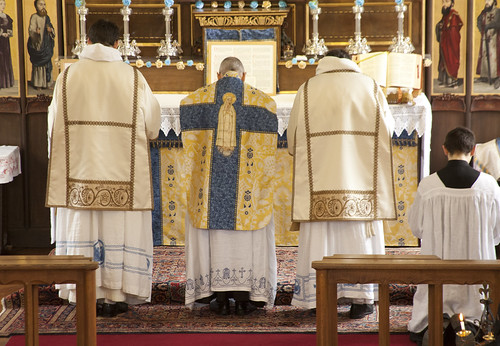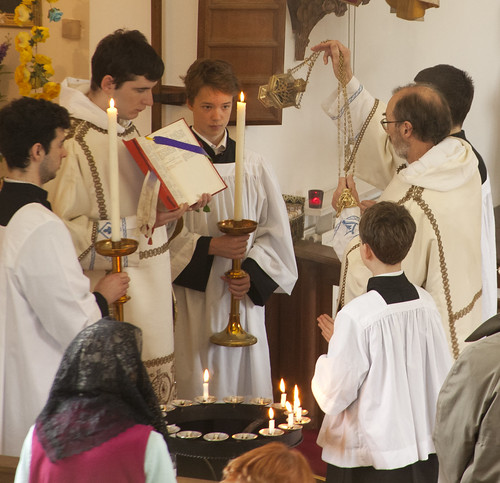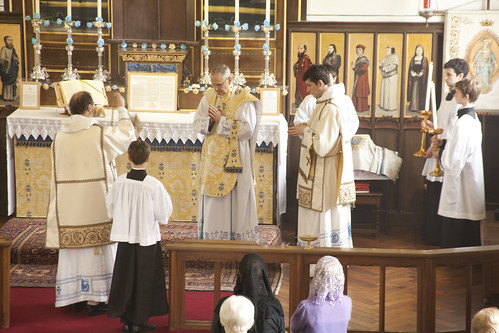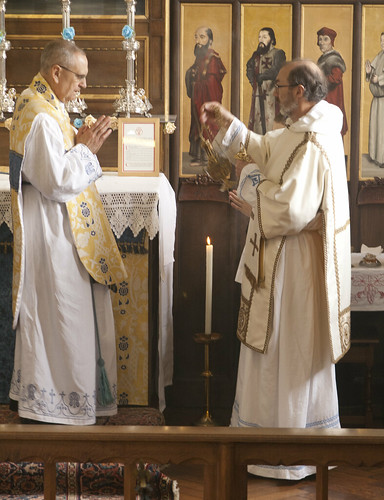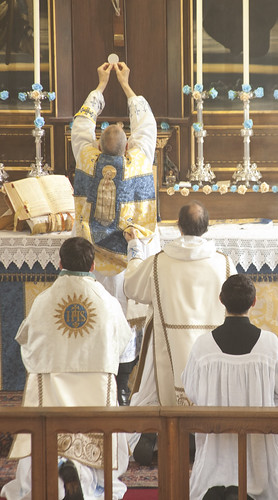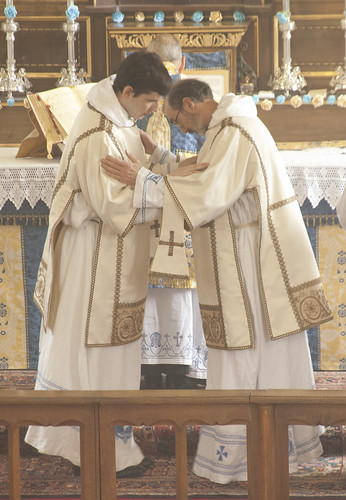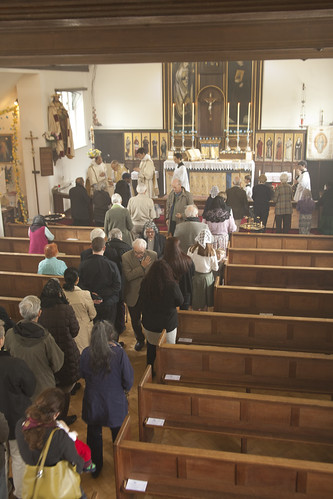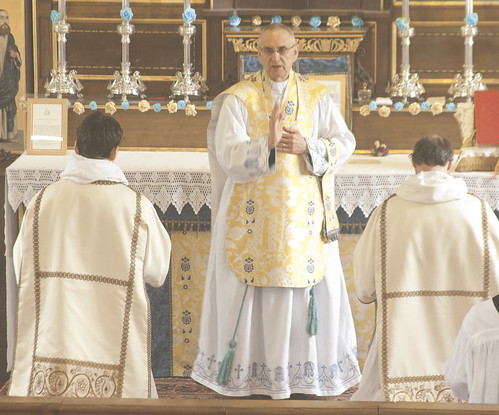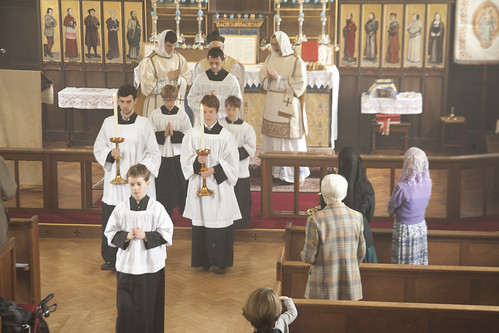Chairman's Blog
YouTube Video from Roger Buck
Having read two books by Roger Buck, and had some email correspondance with him, it is rather interesting to see him in the flesh, so to speak, on video, for the first time.
My posts about his books:
The lovely Gentle Traditionalist, suitable for non-Trads and indeed non-Catholic readers.
The longer Cor Jesu Sacratissimum: From Secularism and the New Age to Christendom Restored, detailed critique of the New Age, partly autobiographical, and a plea for the restoration of Europe.
Support the work of the LMS by becoming an 'Anniversary Supporter'.
Eucharisticum Mysterium: blog post for the Catholic Herald
The Catholic Herald has published a post of mine on the 50th anniversary of one of the documents preparing the way for the Novus Ordo Missae. The highlight of the document is the evolving attitude to concelebration.
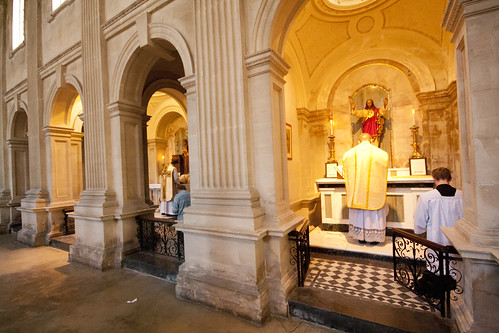 |
| Simultaneous Low Mass at the LMS Priest Training Conference in Prior Park, |
Today is the 50th anniversary of the Instruction Eucharisticum Mysterium, signed by both the Prefect of the soon-to-be abolished Sacred Congregation of Rites, and the President of the Concilium, the temporary institution in charge of the liturgical reform. It now represents a fascinating snapshot of a fast-moving action sequence.
Support the work of the LMS by becoming an 'Anniversary Supporter'.
New book on the Third Secret of Fatima
 Kevin Symonds, whose book on the composition of the Prayer to St Michael I recommended on this blog back in 2015, has written another careful, thorough, and sober study of a subject surrounded by conjecture: the 'Third Secret' of Fatima.
Kevin Symonds, whose book on the composition of the Prayer to St Michael I recommended on this blog back in 2015, has written another careful, thorough, and sober study of a subject surrounded by conjecture: the 'Third Secret' of Fatima.
Get it from Amazon.co.uk
I've provided a publicity-blurb for it as follows:
Symonds has done a very thorough job in getting to the bottom–insofar as it is possible–of the various confusions and conspiracy theories on the subject of the Third Secret, making a compelling case that what the Vatican published in 2000 was the whole text of it as written by Sr Lucia. No doubt the debate will continue, but the clarity and intellectual honesty of Symonds’ work, with copious reference to the relevant sources in their original languages, will be of enormous assistance for scholars in the future who wish to understand this tangled affair. –Dr. Joseph Shaw
I hope my regular readers won't be put off the book by the fact that, after exhaustive investigation of how each claim has come to be made and how the evidence stacks up, Symonds concludes that the various conspiracy theories to the effect that the Third Secret was not really revealed by the Vatican when the vision of the martyrdom of the 'bishop dressed in white' was finally published, fail: that is, that the Vatican really did publish everything they had.
I have read various things in support of these theories which, at the time, I found convincing, but Symonds shows, with painstaking detail, that there is less to these than meets the eye. Whatever you may want to believe, this book really must be taken into consideration.
He doesn't address the question of whether the Consecration of Russia has been done.
All the stuff about the alleged length and physical shape and alarming contents of the letter sent by Sr Lucia with the secret in it are considered, and it gets rather complicated. There is a larger and more earthy question, however, which used to worry me: if the secret was as un-explosive as the Vatican revealed it to be, why was it not published earlier? Symonds gives the following answer. Since the vision of the 'bishop dressed in white' appears to be a prophecy of the assassination of a pope, to have published it much earlier would have been for the Vatican to say, in effect, that they expected such an event to take place. It would have been like putting a target on the Pope's back: a challenge to every nutcase and hostile government on the planet to kill the Holy Father. Only insofar as they were able to say that, with hindsight, the vision was about the attempted assassination of Pope John Paul II in 1981, and more especially after the fall of Communism, could it be published without this kind of worry.
Get it from Amazon.co.uk
Support the work of the LMS by becoming an 'Anniversary Supporter'.
SSPX ordinations: with permission from the Holy See
 This is really wonderful news: Bishop Fellay, Superior of the Society of St Pius X, has said (h/t Rorate Caeli) that he recieved a letter from the Holy See last year telling him that he could continue with priestly ordinations, without needing permission from the local bishop. This is a move I noted as a possible 'next step' after those involving confession and marriages in my 'Chairman's Message' in the latest Mass of Ages, which I reproduce below.
This is really wonderful news: Bishop Fellay, Superior of the Society of St Pius X, has said (h/t Rorate Caeli) that he recieved a letter from the Holy See last year telling him that he could continue with priestly ordinations, without needing permission from the local bishop. This is a move I noted as a possible 'next step' after those involving confession and marriages in my 'Chairman's Message' in the latest Mass of Ages, which I reproduce below.
Support the work of the LMS by becoming an 'Anniversary Supporter'.
Mass of Ages: Summer 2017 edition published

If your local church doesn't have copies, get one by post here.
Bishop Schneider on Pentecost and the Holy Spirit.
James Bogle on the Emperor, Bl Charles of Austria.
Plus: Antonia Robinson, LMS Committee Member and Local Representative for Thanet, introduces the LMS Family Contact Register.
• The Lone Veiler with some words of wisdom from St Augustine
• Caroline Shaw looks at a pilgrim’s souvenir from the 16th Century: The miraculous bleeding Host of Dijon
• Fr Bede Row asks, “Do we still believe in marriage?”
Support the work of the LMS by becoming an 'Anniversary Supporter'.
Who are Pope Francis' 'rigid Catholics'?
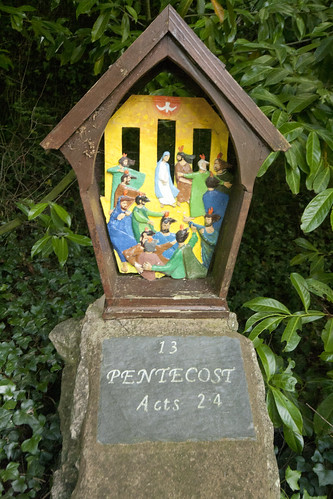 |
| Crush not the spirit. From the Rosary Walk at Pantasaph, the Franciscan Retreat Centre in North Wales. |
“Communion is essential,” Francis said. “Sometimes it can be better to renounce living in every detail what your own path demands, in order to guarantee unity among the brothers who form the one ecclesial community, of which you must always feel yourself a part,” he said.
Translation: If local pastors or the bishop asks you to join everybody else for Mass on Sunday, do it. If the Vatican tells you to play by the liturgical rulebook, do that too.
Second, Francis urged the Neocatechumenate to respect the local cultures in which the group wants to put down roots.
Learning foreign languages is helpful, the pope said, but “much more important will be your commitment to learning the cultures that you meet, recognizing that the need for the Gospel is everywhere, but also [recognizing] the work of the Holy Spirit in the life and the history of every people.”
Translation: Don’t ride into places such as Japan, or Nepal, and insist that in addition to becoming Catholic, everybody also has to become Spanish or Italian.
Third, the pope asked the Neocatechumenate to foster internal freedom and to respect those who decide to leave the group.
“Everyone’s freedom must not be coerced,” he said, “and the eventual choice of anyone who decides to seek other forms of Christian life … outside the [Neocatechumenate] must be respected.”
Translation: Lighten up internally, and when somebody leaves, don’t swing into action like a K Street lobbying firm specializing in character assassination.
It hurts the heart when, before a church, before a humanity with so many wounds, moral wounds, existential wounds, wounds of war, which we all hear of every day, to see that Christians begin to do philosophical, theological, spiritual “byzantinism”, rather what is needed is a spirituality of going-out. Go out with this spirituality: do not remain securely locked inside. This is not good. This is “byzantinism”! Today we have no right to byzantinistic reflection. We must go out! Because — I have said this many times — the Church seems like a field hospital. And when one goes to a field hospital, the first task is to heal the wounded, not to measure cholesterol... this will come later.... Is this clear?
After 60 years, the original charism has not lost its youthfulness and vitality. However, remember that the centre is not the charism, the centre is one alone, it is Jesus, Jesus Christ! When I place at the centre my spiritual method, my spiritual journey, my way of fulfilling it, I go off the itinerary. All spirituality, all charisms in the Church must be “decentralized”: at the centre there is only the Lord! For this reason, in the First Letter to the Corinthians, when Paul speaks of charisms, of this most beautiful reality of the Church, of the Mystical Body, he ends by speaking of love, of that which comes from God, which is truly God’s, and which allows us to imitate Him. Never forget this, to be decentralized!
Thus the charism is not preserved in a bottle of distilled water! Faithfulness to the charism does not mean “to petrify it” — the devil is the one who “petrifies”, do not forget! Faithfulness to the charism does not mean to write it on a parchment and frame it. The reference to the legacy that Don Giussani left you cannot be reduced to a museum of records, of decisions taken, of the rules of conduct. It certainly entails faithfulness to tradition, but faithfulness to tradition, Mahler said, “is not to worship the ashes but to pass on the flame”. Don Giussani would never forgive you if you lost the liberty and transformed yourselves into museum guides or worshippers of ashes. Pass on the flame of the memory of that first encounter and be free!
Like this, centred in Christ and in the Gospel, you can be the arms, hands, feet, mind and heart of a Church “which goes forth”. The way of the Church is to leave her walls behind and go in search of those who are distant, on the peripheries, to serve Jesus in every person who is marginalized, abandoned, without faith, disappointed by the Church, a prisoner of one’s own selfishness.
“To go forth” also means to reject self-referentiality, in all its forms. It means knowing how to listen to those who are not like us, learning from everyone, with sincere humility. When we are slaves to self-referentiality we end up cultivating a “labelled spirituality”: “I’m ACL”. This is the label. Then we fall into the thousands of traps offered to us by the pleasure of self-referentiality; by that looking at ourselves in the mirror which leads us to confusion and transforms us into mere impresarios in an NGO.
Support the work of the LMS by becoming an 'Anniversary Supporter'.
Ann Furedi in Oxford

The Birmingham March for Life is on Saturday: see the full details of the day's event here. The march itself is from 2pm but the day starts with Masses and talks from 9am. It's huge and important; please go if you can.
I'm reposting below my comments from November 2013 on Ann Furedi's talk in support of abortion which took place in Oxford.
--------------------------------------------
Last night I attended a debate organised by Oxford Students for Life. They invited Ann Furedi, head of the country's biggest abortion provider, BPAS; she was opposed by Sarah de Nordwall. I was very impressed, with my experience of abortion debates in the Oxford Union, at the good natured and rational quality of the discussions; this is a great credit to the organisers and their supporters (pro-abortion students were also present, in smaller numbers). It was a nice demonstration, in fact, that the hysteria in the abortion debate does not, in the main, come from pro-lifers, despite the strength of feeling on their side of the debate.
I was impressed by Sarah de Nordwall, particularly in the way she handled hostile questions. This blog post, however, which I promised Sarah I would write, is about what Ann Furedi had to say.
Furedi was witty and articulate. She made a number of very interesting concessions at an early stage which helpfully closed off a number of dead-ends for the discussion. She reminded us, for example, that there is no legal right to abortion in English law. Something else very interesting which she said is that until 1990 there was no time-limit on abortions in Scotland, but there were no more late-term abortions there than in England before then. Her point was that women don't want late-term abortions. Pro-lifers may need to consider the efficacy of time-limit legislation as a means to reduce abortion numbers.
| Sarah de Nordwall surrounded by Dominicans |
Furedi's argument for a moral right to abortion turned on two ideas. The first was that moral personhood is assocatiated with functional attributes, such as self-consciousness. As the debate went on she seemed to back away from this idea somewhat; she didn't want to draw the conclusion, for example, that infanticide was permissible. So her argument came to rely exclusively on the second idea, which is that for a pregnant woman a moral right to abortion followed from her right to 'bodily integrity'. Actually I think 'bodily self-determination' might be a better term for her intuition here. What happens inside a body, in effect, should be up the owner of the body.
I felt that this argument should have come under more pressure in the debate, and I offer here some objections to it.
1. The argument appears to generate the conclusions Furedi wants only if the distinct existence and bodily integrity of the fetus is ignored. Given that the fetus has his own body, that brings something else into the equation which needs to be taken into consideration. What right has a women to interfere with another person's body? Furedi appears to think 'none' if the woman is a pro-life activist taking an interest in the fate of a woman considering an abortion (a point she made a number of times), but if the woman is a pregnant mother it appears to be quite different in relation to her unborn child. The first point noted above was designed I suppose to deal with this, but as Furedi conceded it cannot bear the argumentative weight: just because a human can't talk doesn't take away a moral status he would otherwise have. This being so, Furedi's argument seems to defeat itself: if we have the right to bodily self-determination, then the fetus' right would prevent the mother from aborting.
The responses Furedi made to this kind of point consisted of insisting on the lesser moral status of the fetus. Although she wasn't able to make a principled argument for this, she seemed to think it was sufficiently obvious, even while conceding that a fetus has value - more, as she put it, than a goldfish or a cat. But given that the fetus' life is at stake, and the mother's is not, to say that the fetus weighs less in the scales of value is not enough. I might be obliged to suffer a lot of inconvenience to save the life of, say, a whale, a colony of rare bats, or, come to that, to ensure the continued existence of an historic building.
 |
| Ann Furedi |
2. The principle of radical bodily self-determination, which Furedi needs, is not plausible, and is not applied in law or in common-sense moral thinking. Examples which show this are suicide and body-integrity disorder. No one has the moral right to commit suicide, which is why we all think that it is permissible for bystanders to save a would-be suicide from (say) drowning, or talk him off the window ledge. (The Samaritans even abandon their normal 'non-directive' counselling for prospective suicides.) Those suffering from body-integrity disorder, who want healthy limbs amputated, do not have the right to undergo the amputations, indeed it would be wrong for a doctor to carry out their wishes. These cases do not even involve the agents directly harming other parties, so a fortiori it cannot be concluded from our intuition that people are 'in charge of their own bodies', that a mother can harm a fetus enclosed inside her body. Yes, we say casually that we can do what we like with our bodies, but the principle here is a weak one. It may include body-piercing, but it doesn't even extend to experimenting with hard drugs, let alone anything more dramatic or irreversible.
A wider point is about people being (morally) the best judges of their own interests. The statute books are bursting with laws to prevent people making stupid decisions on the basis of what they imagine are their best interests. Everything from building regulations to tobacco duty acknowledges that the law has a role in guiding rational, grown-up and autonomous decision-makers away from bad decisions.
3. Furedi conceded that some women think of abortion in a moment of confusion and panic, and being better-informed or just a bit calmer they may well change their minds. She also conceded that many women are under intense social pressure to abort baby girls. She appealed to the case of the women who are cool, calm, and collected, and decide rationally to go through with it as being in their best interests. I would have liked to have asked, in light of this, whether making abortion easier, legally or practically, is in the best interests of women overall. It certainly isn't in the interests of the first kinds of cases, who are more likely to do something they later regret, and are easier for others to bully, the easier abortion is to arrange. Even supposing the cool, calm ones are right about their interests (see point two), it is far from clear that this means that a situation should be perpetuated in which many, many others end up being violated in the most horrible way, when they cave in to pressure to have an abortion which they do not want.
Again, compare the case with drugs. Drug users constantly tell us that, in the immortal phrase, 'they can handle it'. Suppose they can - suppose it is true that a certain proportion of users can genuinely derive pleasure from hard drugs without it destroying their lives. As an argument for de-criminalisation this is extremely weak, because everyone can see the drugs users who clearly can't handle it, and making drugs more widely available will cause terrible harm to people in that category.
These parallels are not exact. It is for the pro-abortion advocates to explain, however, what is the principled basis of a moral right to abortion, and why such principles don't lead to counter-intuitive results when applied to other cases.
Votive Mass for Fatima: photos
Here are some photos of the Votive Mass of the Immaculate Heart which was celebrated in SS Gregory and Augustine by Fr John Saward, last Saturday: 13th May.
Support the work of the LMS by becoming an 'Anniversary Supporter'.
'What does Fatima mean?' by Hamish Fraster
 |
| Hamish Fraser with a dove on his head: one released during a Fatima conference in Paris. |
I'm not an expert on Fatima, but I thought that this excerpt from Hamish Fraser's book Fatal Star serves a useful contrast, and perhaps corrective, to certain conventional views of 'the message of Fatima'. The blog title is taken from a section heading in the book, p145, and the passage below follows it.
It is true that Our Lady of of Fatima did ask for prayer: for the Daily Rosary, the First Saturday devotion, and for the wearing of the brown scapular. Nevertheless, these are purely incidental to the essence of the Fatima message. This was made clear to John Haffert ... of the international Fatima apostolate...
When Haffert asked Sister Lucia whether the principle [sic] request of her heavenly visitor was for the Rosary, Sister Lucy's answer was most emphatically in the negative. Moreover, he affirms that her reply was given with a quite "surprising assurance" [from Haffert Russia will be Converted]. And Haffert, who is far too honest not to admit it, tells us that until then he had always assumed that the Rosary to be Our Lady's principal request.
When he asked what was her principal request, the reply came with no less assurance: "Penance".
Nor did the penance requested imply any spectacular recourse to fasting, flagellation or the wearing of hair shirts. According to Sister Lucia, Our Lady made it perfectly clear that all she was asking for was "the faithful accomplishment of our daily duties". And she proceeded to explain that Our Lady had requested the Daily Rosary, the First Saturday devotions and the wearing of the brown scapular, in order that the Faithful might have the spiritual fortitude necessary to the leading of truly Christian lives.
In other words, Fatima is the complete answer to the spurious piety of the gunman with a prayer on his lips.
As a former active and senior member of the Communist Party, both in the Spanish Civil War and in industrial Glasgow, Fraser was particularly interested in the connection with the conversion of Russia. He goes on to argue that, quite aside from any spectacular supernatural intervention, Russia's conversion would be inevitable if the Church's social teaching was manifested in the daily lives (including the work lives) of Catholics around the world.
P149
In light of this recognition, the Catholic business man would not confine himself to making generous donations to the Church; in the market place no less than in the sacristy he would make it abundantly clear that to all and sundry that business need not always mean mere business. As an employer of labour, he would, like the Harmels and Alan Turner, provide a living example of the meaning of the great social encyclicals.
The Catholic worker would be similarly distinguished from the herd of the class-conscious. An ardent defender of justice for his fellow-workers and a conscientious member of his trade union, he would seek to give to the latter that Christian idealism which in the nineteenth century so distinguished the British trade unions from their anti-religious counterparts on the Continent. Insisting on the dignity of labour, he would insist no less on the humanity of the employer, and would refuse to be stampeded by the prevalent assumption that the doctrine of original sin is applicable only to owners of capital. ...
If, therefore, only the Catholic business men and the Catholic workers in our hypothetical parish were thus won over to realise that meaning of Christ's Kingship as it affected their daily lives, the mission of the Church would become visible for the first time in the modern world to the non-Catholic section of the population no less than to the Faithful themselves.
Fatal Star was first published in 1954. While I agree entirely with Fraser's point about the lost opportunity of the pre-conciliar era in the implementation (or even effective promulgation) of the Church's social teaching, compared with today the Faith was remarkably clearly manifested in the daily lives of Catholics at that time, and this was indeed why the Church enjoyed, again compared with today, such buoyant rates of conversion. It was manifested in practices like Friday abstinence, the stoic response of Catholics to prejudice and discrimination, the reluctance of Catholics to marry outside the Faith (which was connected with the large number of 'marriage converts'), and increasingly counter-cultural Catholic attitudes to divorce, abortion, euthanasia, contraception, and family size. Fraser could have no idea how bad things were about to become.
Not many Catholics today could hope to take a significant practical hand in influencing their work-places in light of Catholic social teaching, but the general point is more important than ever. Living our lives in a truly Catholic way means allowing the Faith to make a difference to what we actually do, and the difference it makes will be a stark one in many areas of life. We certainly can't respond to the message of Fatima if we are not doing this much.
Support the work of the LMS by becoming an 'Anniversary Supporter'.
Why I'm not going to lambast Traditional Catholics
 |
| Self-cricism. They were executed anyway. |
I've been taken to task for defending Catholics attached to the Traditional Mass from various exagerated criticisms, and for pointing out that other identifiable groups in the Church have the same characteristics, if not worse ones, rather than engaging in Maoist-style self-criticism. Today I'm going to say a bit more about this.
We are all sinners, and if anyone reading this has a story about a sinful Traditional Catholic, I'm not going to claim that such a thing could not be true. There are a number of dangers, however, with Maoist self-criticism, which really should be obvious.
1. It is narcissistic and inward-looking. Frankly, the personal qualities of Traditional Catholics are not very important for the Church as a whole. Let's just get over ourselves, shall we?
2. It implies the truth of generalisations about Traditional Catholics, which is itself uncharitable. For me to say 'I've heard these criticisms and there is truth in them - yes, [taking out an onion] I'm a Traditional Catholic, and I'm a bitter, hate-filled, Pharisee' implies something not just about me personally but about the group as a whole: it is an accusation against my fellow trads, and one I have no right to make.
3. Public self-criticism implies moral superiority. Only the morally superior are so humble as to accept snarky criticisms as the Voice of Conscience. To do this publicly is to declare one's superiority publicly. The paradox is acute because we are being accused, among other things, of thinking ourselves superior. If there is an ounce of sincerity or compassion or indeed common-sense in our accusers, the reaction they will seek from us will not be a public proclamation of humility.
4. It suggests a degree of uniformity among trads which is completely false. Traditional Catholics (thank heavens) are not members of a cult. We haven't all been through some kind of training, we have no means of enforcing 'message discipline', and some of the people in a typical EF congregation will only recently have started going - others may be trying it out for the first time. We have nothing in common with each other in terms of education, life experience, social class, or ethnic background. This may be a shock to some people who have come to expect every movement in the Church, and every 'type of Mass' (Family Mass, Student Mass, Polish Mass etc. etc.) to be colonised by a 'type of Catholic'. We are not a 'type of Catholic': we are simply Catholics who love the Traditional Mass. That brings with it an interest in traditional spirituality, traditional devotions, and, in general, orthodoxy. But we have very different personalities and life experiences: to suggest we are all, for example, pessimistic, or afflicted by pride, or that we have specific tastes, is to engage in a very unhelpful fantasy. I'm certainly not going to engage in that fantasy myself.
5. To promote a Public Relations programme for Traditional Catholics to make the movement more attractive would, if possible (which it is not), turn the movement into something fake. 'Watch out, everyone! there's a non-trad coming, big smiles everyone, no-one mention sin or penance, no-one talk about Pope Francis! We'll be able to relax when he's gone...' Is that the kind of movement we want to be? That is what cults do. I've heard it said that this is what some movements in the Church do. If that is true, that is a terrible thing. By all means be polite and tactful, but don't be fake. We should be at home in the Church. We should be at our ease when chatting with our fellow Catholics.
6. To engage in specific apostolates as a PR exercise is to instrumentalise the suffering and needs of others. It has been suggested that Traditional Catholics do more 'for the poor' in obvious and eye-catching ways to counter the accusastion that we are less interested in social justice than we should be. This is an unworthy suggestion. Traditional Catholics, like everyone else, look about them to see what needs of our fellow creatures are most urgent and what we have the resources and skills to address. Trads are very heavily involved in the pro-life movement and in education, and (obviously) in supporting the Church's liturgy in all sorts of ways. To suggest this are the wrong things to focus on for public relations reasons is an insult not just to the good people who spend their time and money so freely for their fellow men in these particular ways: it is an insult to the people who would benefit from the more PR-friendly work. They are being treated like extras in a publicity stunt.
7. Public self-criticism gives credence to accusations which in many cases are projection (people accuse us of what they fear about themselves), and in other cases are actually criticisms of the tradition itself. Shall I tell you why certain liberal Catholics think that trads are 'judgmental', for example? Because, first, they are themselves judgmental, casting anyone with whom they disagree into outer darkness. And second, because they think the traditional Mass, and associated devotions and spirituality, is judgmental. After all, they might say, since the EF, with its references to sin, is horrible and judgmental, surely the only people who like it will themsevles be horrible and judgmental. In this situation, to say 'yes, maybe we are a bit horrible and judgmental' is the worst possible response. It may sound arrogant to some for us to reject such accusations, but what is needed here is for people to say: actually, you don't need to be like that to like the Traditional Mass, because the Traditional Mass is not itself like that.
To conclude, insofar as I can be said to have a position of leadership or influence in the Traditional movement, is absolutely not my role to act as some kind of morality policeman. Further to point 3, criticising one's fellow traddies (for being judgmental and superior etc.) is precisely to engage in the behaviour (being judgmental and superior) which is being criticised in the first place. The idea that the movement should have a clique of scribes and pharisees going around keeping everyone else up to the mark is so utterly insane, as a response to the kings of criticisms to which we have been subjected, that I can only appeal to the common sense of those involved in this debate to see the problem. Come on, have a laugh: it's just silly, isn't it?
Support the work of the LMS by becoming an 'Anniversary Supporter'.

